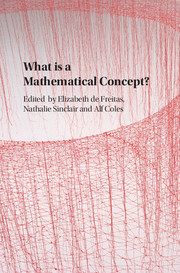
-
Select format
-
- Publisher:
- Cambridge University Press
- Publication date:
- 26 July 2017
- 22 June 2017
- ISBN:
- 9781316471128
- 9781107134638
- Dimensions:
- (228 x 152 mm)
- Weight & Pages:
- 0.59kg, 302 Pages
- Dimensions:
- Weight & Pages:
- Subjects:
- Mathematics (general), Mathematics, Psychology, Educational Psychology
You may already have access via personal or institutional login- Subjects:
- Mathematics (general), Mathematics, Psychology, Educational Psychology
Book description
Responding to widespread interest within cultural studies and social inquiry, this book addresses the question 'what is a mathematical concept?' using a variety of vanguard theories in the humanities and posthumanities. Tapping historical, philosophical, sociological and psychological perspectives, each chapter explores the question of how mathematics comes to matter. Of interest to scholars across the usual disciplinary divides, this book tracks mathematics as a cultural activity, drawing connections with empirical practice. Unlike other books in this area, it is highly interdisciplinary, devoted to exploring the ontology of mathematics as it plays out in different contexts. This book will appeal to scholars who are interested in particular mathematical habits - creative diagramming, structural mappings, material agency, interdisciplinary coverings - that shed light on both mathematics and other disciplines. Chapters are also relevant to social sciences and humanities scholars, as each offers philosophical insight into mathematics and how we might live mathematically.
Reviews
'How splendid it is that this volume is devoted to so fundamental, and so grand, a question: What is a mathematical concept? And how wide a range of concepts are featured: from 'function machines' and 'the act of doubling' in their role in early education, to 'the act of halving' as it might reveal aspects of the currently developing foundations offered by homotopy type theory; from the jewels of geometry such as the stellated octahedron, to the extraordinary role that the newly fashioned concept of perfectoid spaces plays in resolving conjectures in arithmetic algebraic geometry and representation theory.'
Barry Mazur - Gerhard Gade University Professor, Harvard University
'Mathematics has far too often been a discipline reserved for specialists. Even philosophers have tended to limit their focus to the foundations of mathematics, rather than the productions of contemporary mathematics. This is a wonderful book that reverses this trend. It approaches mathematical concepts from a perspective that is broadly humanistic and interdisciplinary, drawing on disciplines as diverse as history, philosophy, sociology and psychology. Each of the essays is written in a non-technical yet rigorous manner that should be accessible even to the 'mathematically challenged', and taken together they present a richly innovative approach to the ontology of mathematics. This is a timely and user-friendly collection that should help restore mathematics to its rightful place as a central discipline in the humanities.'
Daniel Smith - Purdue University, Indiana
Contents
Metrics
Altmetric attention score
Full text views
Full text views help Loading metrics...
Loading metrics...
* Views captured on Cambridge Core between #date#. This data will be updated every 24 hours.
Usage data cannot currently be displayed.
Accessibility standard: Unknown
Why this information is here
This section outlines the accessibility features of this content - including support for screen readers, full keyboard navigation and high-contrast display options. This may not be relevant for you.
Accessibility Information
Accessibility compliance for the PDF of this book is currently unknown and may be updated in the future.


